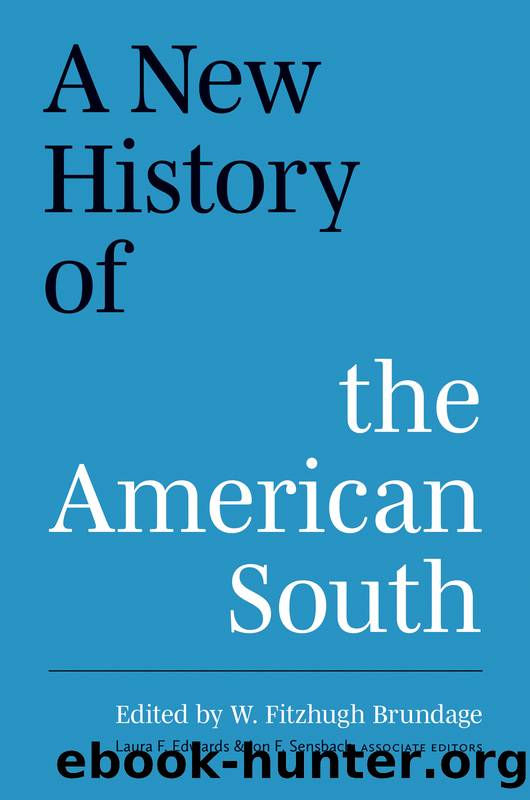A New History of the American South by W. Fitzhugh Brundage;Laura F. Edwards;Jon F. Sensbach;

Author:W. Fitzhugh Brundage;Laura F. Edwards;Jon F. Sensbach;
Language: eng
Format: epub
Publisher: University of North Carolina Press
Published: 2023-06-15T00:00:00+00:00
As white and Black southerners struggled to assert control over their lives and to find allies in the military and provisional governments in 1865â66, newly appointed politicians tried to devise new political structures to organize and limit those efforts. The South would not be governed solely from within but instead had to respond to political pressure from Washington. Andrew Johnsonâs provisional governors were charged with calling elections for constitutional conventions to remake new state governments. In these constitutional conventions, and then in the legislatures that followed in the winter, democracyâin a limited, whites-only formâproduced a new set of power brokers. The fact that new constitutions had to be written was a sign of the powerful impact of the United Statesâ intervention in southern life. American politics was premised on the idea that the local governments, especially the states, had exclusive domain over many purely internal questions and that the United States could not require existing states to rewrite their foundational constitutions. But this was no normal time, and these were notâdespite the erudite arguments of lawyers and editorsâexisting states.
The new constitutional conventions and legislatures during Presidential Reconstruction demonstrated the transformation of power in the former Confederacy. President Andrew Johnson told white southerners that they should ratify the Thirteenth Amendment, end slavery, renounce secession, andâfor most statesâabandon hopes of paying off Confederate debt. These were all significant changes in the southern political structure forced from above. For Johnson the carrot was the potential to be returned to the U.S. Congress, with the promise that this resumption of normal political power would also mean the end of the special wartime authority the army continued to wield on the ground in the rebel states. The stick was the possibility that they might be held under martial law longer if they refused to comply.
But the elections over the late summer to early winter of 1865â66 also provided new forms of legitimacy to the ongoing resistance by former Confederates. In conventions, delegates frequently rejected Johnsonâs suggestions and at times had to be told directly by commanding generals that they had to either accept his terms or prepare for ongoing military rule. Whites-only elections empowered many of the most belligerent members of white southern society. While Johnson had often appointed skeptics of secession to provisional office, white southern voters consistently voted for secessionists and Confederate leaders. âI donât vote for no man as long as I live, who didnât go with the State in the revolution,â one white Georgian told a northern reporter.14 In Savannah, the same journalist reported widespread anger and resentment directed at northern whites. âThere are many counties in the State in which northern labor and capital would not be safe but for the presence of the military. ⦠Not to have âgone with the Stateâ in her late struggle is now to be scorned and condemned.â Even those who had spoken against secession in January or February 1860 now competed to be seen as ardent Confederates. Benjamin Hill, a former Confederate senator (and future U.
Download
This site does not store any files on its server. We only index and link to content provided by other sites. Please contact the content providers to delete copyright contents if any and email us, we'll remove relevant links or contents immediately.
| Americas | African Americans |
| Civil War | Colonial Period |
| Immigrants | Revolution & Founding |
| State & Local |
In Cold Blood by Truman Capote(3148)
Steve Jobs by Walter Isaacson(2770)
The Innovators: How a Group of Hackers, Geniuses, and Geeks Created the Digital Revolution by Walter Isaacson(2546)
All the President's Men by Carl Bernstein & Bob Woodward(2273)
Lonely Planet New York City by Lonely Planet(2120)
The Room Where It Happened by John Bolton;(2042)
And the Band Played On by Randy Shilts(2025)
The Poisoner's Handbook by Deborah Blum(1997)
The Murder of Marilyn Monroe by Jay Margolis(1990)
The Innovators by Walter Isaacson(1984)
Lincoln by David Herbert Donald(1881)
A Colony in a Nation by Chris Hayes(1803)
Under the Banner of Heaven: A Story of Violent Faith by Jon Krakauer(1693)
Amelia Earhart by Doris L. Rich(1592)
The Unsettlers by Mark Sundeen(1591)
Birdmen by Lawrence Goldstone(1542)
Dirt by Bill Buford(1533)
Zeitoun by Dave Eggers(1526)
Decision Points by George W. Bush(1469)
